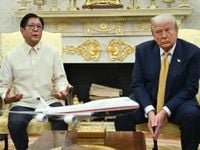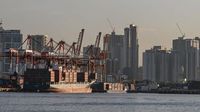On July 22, 2025, President Donald Trump announced a significant trade deal with the Philippines following a high-profile meeting with Philippine President Ferdinand Marcos Jr. at the White House. The agreement, unveiled on Trump's social media platform Truth Social shortly after their Oval Office encounter, sets a 19% tariff on goods imported from the Philippines into the United States, a slight reduction from the 20% tariff Trump had threatened to impose starting August 1. In exchange, the Philippines will open its market to U.S. goods, allowing American products to enter without tariffs.
Trump described the visit as "beautiful" and praised Marcos as a "very good, and tough, negotiator." He emphasized the growing military cooperation between the two Pacific allies, stating, "In addition, we will work together Militarily." Marcos, the first Southeast Asian leader to meet Trump in his second term, hailed the deal as a "significant achievement," noting that while a 1% concession might appear minor, it carries substantial real-world impact.
"One percent might seem like a very small concession. However, when you put it in real terms, it is a significant achievement," Marcos told reporters in Washington, DC. He also revealed that the Philippines was considering opening its automobile market to U.S. vehicles with zero tariffs, a move aimed at balancing trade and deepening economic ties.
The trade agreement arrives amid shifting geopolitical dynamics in the Indo-Pacific region, with China’s increasing assertiveness in the South China Sea heightening tensions. The Philippines, a long-standing U.S. treaty ally, has found itself at the center of these regional rivalries, particularly over contested maritime territories such as the Scarborough Shoal. Marcos underscored the Philippines' independent foreign policy stance, stating, "Our strongest partner has always been the United States," while also maintaining diplomatic ties with Beijing.
During his three-day visit to Washington, which began on July 20, Marcos met with key U.S. officials, including Defense Secretary Pete Hegseth and Secretary of State Marco Rubio. At the Pentagon, Marcos reaffirmed the mutual defense commitment as the "cornerstone" of the U.S.-Philippines relationship and thanked the U.S. for support in modernizing the Philippine armed forces. Hegseth has previously emphasized that China poses a threat, with the U.S. strategically reorienting to deter aggression in the region.
Trade figures underscore the importance of the bilateral relationship. In 2024, the U.S. had a goods trade deficit of nearly $5 billion with the Philippines, with total bilateral trade reaching $23.5 billion—a 21.8% increase from the previous year. The U.S. remains a vital market for Philippine exports, accounting for nearly 16% of the country's total exports, including semiconductors and electronic products. Conversely, the Philippines imports significant quantities of U.S. agricultural goods, machinery, cereals, and materials used in semiconductor and transport equipment manufacturing.
Marcos acknowledged the trade imbalance and expressed a commitment to increasing imports from the U.S., including soy, wheat products, and medicines. He noted the importance of economic strength in serving as a robust partner to the U.S. in the Asia-Pacific region.
Trump's announcement also included details of a parallel trade agreement with Indonesia, which, like the Philippines deal, establishes a 19% tariff on goods imported into the U.S. from Indonesia, while U.S. goods entering Indonesia will generally face zero tariffs. Indonesia agreed to eliminate 99% of its tariff barriers on American industrial, technology, and agricultural products, remove export restrictions on critical minerals, accept U.S. Federal Motor Vehicle Safety Standards, and ease licensing requirements for American agricultural imports.
Despite these developments, questions remain about the implementation of these agreements. Indonesian Coordinating Minister for Economic Affairs Airlangga Hartarto reportedly stated that the planned 19% tariff would no longer apply to Indonesian goods, suggesting some internal government misalignment. The U.S. imported $28 billion worth of goods from Indonesia in 2024, with apparel and footwear among the top imports, while American exports to Indonesia totaled $10 billion, including oilseeds, grains, oil, and gas.
Trump has maintained a firm stance on his August 1 deadline for countries to finalize trade deals or face increased tariffs, which could rise to as high as 50% on some imports. However, many investors have remained unfazed by these threats, as the administration appears to prioritize the quality of trade agreements over sheer quantity.
During the White House event, Trump also hinted at a possible visit to China in the "not-too-distant future," signaling an openness to easing tensions with Beijing. He acknowledged the Philippines' independent approach to China, telling Marcos, "Do whatever you need to do. But your dealing with China wouldn’t bother me at all." Meanwhile, U.S. Treasury Secretary Scott Bessent is scheduled to meet Chinese officials in Sweden later this month to explore further cooperation.
The trade deals with the Philippines and Indonesia form part of a broader U.S. strategy to strengthen economic and military alliances in the Indo-Pacific amid rising competition with China. These agreements follow earlier deals with the U.K. and Vietnam and reflect ongoing efforts to recalibrate global trade relationships.
Despite the positive tone of the announcements, some Filipino officials have expressed reservations about the tariff rates, with one anonymous source describing the increased tariff as "sad" for the Philippines as an ally. Additionally, protests occurred near the White House during Marcos' visit, with Filipino Americans and immigrant workers calling for greater support amid U.S. immigration enforcement actions.
As the trade agreements move from announcement to implementation, their full economic impact remains to be seen. However, the deals underscore the strategic importance of the U.S.-Philippines alliance and the evolving landscape of international trade in the Indo-Pacific region.





